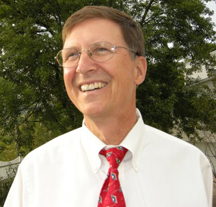WVCTSI to hold reception Dec. 21
MORGANTOWN, W.Va. – Students attending Cheat Lake Elementary School and Mountaineer Middle School recently won an award during a robotics competition after being inspired by a former West Virginia University School of Medicine faculty member with Amyotrophic lateral sclerosis, also known as Lou Gehrig’s disease. The West Virginia Clinical and Translational Science Institute (WVCTSI) will hold a reception honoring the group of fifth through eighth graders on Dec. 21st.James (Jamie) Shumway, Ph.D., was approached by the robotics team, Robo Mojo, earlier this year. The team’s coach, Candice Elliott, asked the former associate dean of medical education if he would be willing to talk to the team about his disease.

“I am in a wheelchair and don’t have the use of my legs. My arms don’t work very well anymore, and so it’s difficult for me to do certain things, like turning off lights. I told the kids what would be helpful for me and tried to get them thinking about developing mechanical approaches to provide me access to do some of the things I need to do,” said Dr. Shumway.
Shumway stopped working at the University in June of this year due to his disease. His wife, Betsy Pyle, said it was nice to have the students reach out to him.
“Even though Jamie is no longer working, he is always open to an opportunity to be involved in education in some way. It was a teachable moment to have the students learn about the disease he is facing,” said Pyle.
Elliott said the purpose of robotics competitions is to encourage kids to work as a team and think creatively and innovatively about problems. For this most recent competition, the theme was finding solutions to senior problems. While the robot cannot help people, Elliott says the hope is that in the future, these children can use their experiences to help people in the state.
“Jamie helped put a real face onto a problem. They were thinking of solutions and having met him, I think the kids were more motivated to come up with a creative idea,” said Elliott. “The kids are young now and so the purpose is to expose them to technology and see that it is not all about building robots to beat each other up, but it’s about thinking of ways to solve real-world problems.”
Uma Sundaram, M.D., founding director of WVCTSI, said it is important to teach children about science, technology and healthcare.
“One of our missions involves training the next generation of clinical and translational researchers, which is why it is important for us to support children and expose them to careers in science and technology starting at a young age. Nurturing these bright students will increase their interest in health related professions relevant to West Virginia’s health disparities,” said Dr. Sundaram.
“We already support the efforts of the Health Sciences Technology Academy with science education through community research projects for high school students. We believe it is also important to excite even our youngest children in science careers,” said Geri Dino, Ph.D., Community Engagement and Outreach Program director for WVCTSI.
Robo Mojo recently placed first in the Robot Performance Award category during the West Virginia FIRST LEGO League Senior Solutions Challenge State Championships. In addition to building a robot, the teams taking part offered solutions to challenges facing senior citizens.


